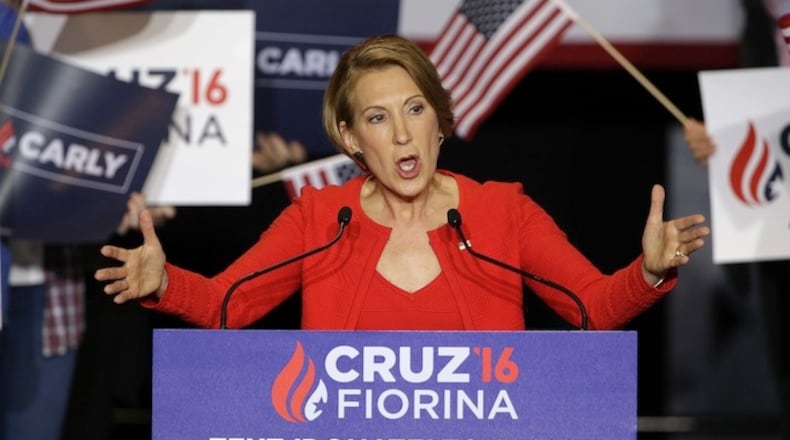The last best chance for Republicans to stop Donald Trump from claiming their presidential nomination is California; beat him there, and the anti-Trump forces just might send the race into overtime at the Republican National Convention in Cleveland.
The best chance to do that, if you believe the current polls, was for Ted Cruz and John Kasich to join forces.
Not in a vague non-aggression pact, but on a ticket: Cruz-Kasich, or Kasich-Cruz, but probably Cruz-Kasich given Cruz's much better standing in the delegate race so far.
Add their poll numbers together right now, and you're even with Trump in the state. Defeating him there remains possible.
Cruz just nuked those chances by announcing former presidential candidate Carly Fiorina as his pick to be vice president, should he secure the nomination. It's quite likely that there were no actual chances to nuke -- that neither Cruz nor Kasich was willing to consider dropping his campaign this late in the game and sign on as the other's No. 2. It's also possible that one of them was willing to do that, but the other was not.
In either case, the result is the same. There will be no late-inning, anti-Trump tag team from his last two remaining rivals. Either their individual efforts will block him from clinching pre-convention, or they will not. Cruz and Kasich will wake up tomorrow with a chance -- to be clear: Cruz's chance appears much, much larger than Kasich's -- to win the GOP nomination this year. They will also almost certainly wake up to a higher chance than ever of Trump being the nominee.
This is classic game theory. It's a collective-action problem, or, as I suggested in February, what history might come to call a Trump Problem. It's how a candidate who has won only a (historically low) plurality of votes is on track to lock up the nomination.
At turn after turn, Trump's rivals have refused to band together in an attempt to stop him at all costs. Just enough of them have followed their own self interests (their own dreams of winning the nomination) to allow him to stay atop the race, even when polls showed any number of them beating him in a one-on-one matchup.
In card games such as Hearts, game-theory simulations suggest groups of players who cooperate to block an opponent are much more successful than those who do not. The problem for Republicans, starting last summer when Trump vaulted to the polling lead, was that stopping him was never everyone's top priority. Kasich and Cruz would apparently still not trade their hopes of winning the nomination for better odds of beating Trump. You can see why: Cruz can say he shouldn't drop out because he's the clear No. 2 in the race. Kasich has no future campaign in him, most likely, so why not go all out?
Whatever the logic, they may be out of time. Trump has now won majorities -- not pluralities -- in the last 6 primaries. If he does the same in Indiana and California, he will almost certainly be the nominee. Cruz clearly believes he can beat Trump at the convention (and Kasich says he believes he can, too), but that fight may never come. There are only a few hearts left and Trump still holds high cards. He just may shoot the moon.
About the Author
Keep Reading
The Latest
Featured



